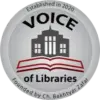
Fakhra Khalid
Impact of Libraries on Economic DevelopmentImpact of Libraries on Economic Development
Economic development is a constant commitment to advancing human existence with quality of life including socio-cultural, political, economic, and general welfare of the people.Libraries play a vital role to the mentally growth of societies, as they gain knowledge for their career, educational, household and economically purpose. Access to information is one of the primary factors in economic development goals. Increased access to information and knowledge, underpinned by universal literacy, is an essential pillar of economic development “Ensure public access to information and protect fundamental freedoms, in accordance with national legislation and international agreement” (IFLA (2015). Increasing the access of information and knowledge across society,the availability ofinformation and communications technologies (ICTs), supports economic development and improves people’s lives.
“The Lyon Declaration on Access to Information and Development shows that libraries, information intermediaries, and development organizations are united behind the inclusion of access to information in the development framework”
With the underlying economic realities in our countrytheeconomy growth is at the stage of developing as inclusively, sustainably, and conductively; libraries intentionally focus on collecting, storing, and disseminating information across different sectors of the economy and bringing about a significant reduction in poverty and increased improvement of the economy.With the impact of libraries on the different institutional’ economy sections, it is shocking that the involvement of libraries in economically development policies has not been sufficiently defined. “Effective inclusion of Library and information services for sustainable development policies are continuously lacking” (Mngutyo et al., 2020).
The library extends its roles to see that all sectorshave global access to information resources and services tailored to the need of every sector especially economic needs. The growing presence of special libraries within private and public establishments makes it possible for the library to reach the specialized information needs of the organizations.Libraries of all kinds are all together helping to circulate needed information services to the respective sectors of the economy leading to the growth and development of the country. Valantin (2014) notes that the ability of the government to develop effective policies and plans depends on its capacity to interpret information relevant to the country’s economic, social, cultural, and financial situation.
Libraries, however, require sound policies to provide the necessary framework for the development of information and communication systems and services to meet the needs of all sectors’ economically requirements. Human knowledge is habitually enriched by information; hence, the collective intellectual abilities of a nation that is; human capital, which will also depend on access to information through a well-equipped library.













